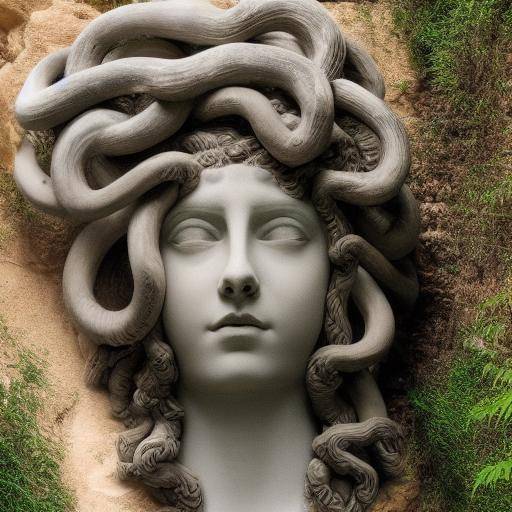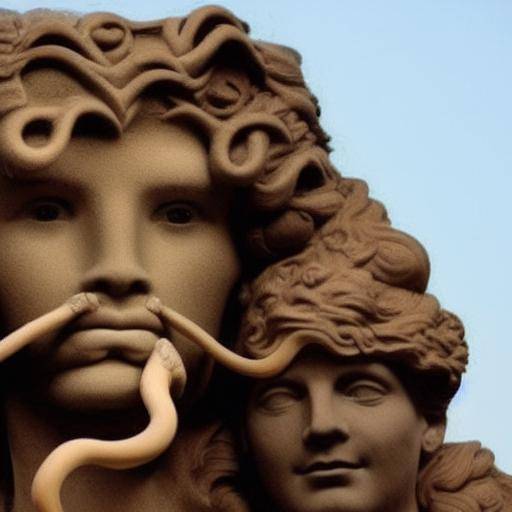
Introduction
Medusa, the petrifying gaze Gorgona, is a fascinating creature of Greek mythology that continues to captivate the imagination of people to this day. His history, full of tragedy and power, has been the subject of countless accounts and representations over the centuries. In this article, we will explore the history of Medusa, the courageous struggle of Perseus to defeat it, as well as the presence of snakes and curses in this account.
History of Medusa
Origins and Transformation
Medusa was originally a beautiful maid, the only mortal among the three Gorgonas sisters. Daughter of Forcis and Ceto, Medusa was known for her incomparable beauty. However, her life gave a tragic turn when she was punished by Athena. According to the myth, Poseidon, the god of the sea, raped Medusa in the temple of Athena. Enraged by the desecration of his temple, Athena transformed Medusa into a monster with snakes instead of hair and a look capable of turning anyone into stone.
Life like Gorgona
After his transformation, Medusa lived in solitude, isolated from the world in a hidden cave. Her petrifying gaze turned her into a feared figure, and the few who dared to approach her abode were converted into stone. The image of Medusa, with his serpent hair and mortal gaze, became a symbol of the power and danger of corrupted beauty and divine vengeance.
Perseus: The Valid Heroe
Birth and Mission
Perseus, son of Zeus and Danae, was a brave and determined hero. His story begins with his grandfather Acrisio, king of Argos, who received a prophecy that said he would be killed by his grandson. Fearing for her life, Acrisio locked Danae in a bronze tower, but Zeus visited her in the form of golden rain, and Perseus was born of this divine union. Acrisio, discovering the birth of Perseus, threw his mother and son into the sea in a chest, which eventually reached the island of Sérifos, where Perseus grew up.
King Polidectes of Sérifos, in love with Danae, saw Perseus as an obstacle. Facing to wish marriage to another woman, Polidectes asked Perseus to bring him the head of Medusa, a mission that seemed impossible and hoped would result in the death of the young hero.
The Search of Perseus
Equipped with gifts from the gods: Hermes' winged sandals, Athena's reflective shield, Hades' invisibility helmet and Hefestus' sword, Perseus undertook his dangerous mission. After locating the Gorgonas, he used the shield to see the reflection of Medusa and avoid his direct look. With precision and courage, Perseus managed to decapitate Medusa while he slept and placed his head in a magic bag.
The Awesome Kingdom of Serpents
Symbolism of Serpents
Snakes have been powerful and multifaceted symbols in Greek mythology and beyond. In the case of Medusa, the serpents that adorn their heads represent both their curse and their power. Associated with wisdom, renewal and danger, serpents in the myth of Medusa underline the duality of their nature: once beautiful and now fearsome.
Serpents in Greek Culture
Snakes in Greek mythology appear in numerous accounts, from the Hermes Caducee to the Piton snake that was murdered by Apollo. In the context of Medusa, snakes are not only a mark of their transformation and destructive power, but also a representation of the complexity of natural and supernatural forces.
Malditions: The Power of Revenge
The Curse of Athena
The transformation of Medusa into a Gorgona was a punishment imposed by Athena, but also a reflection of divine injustice and vengeance. The curse that turned the beauty of Medusa into horror is a recurring theme in Greek mythology, where the gods often severely punish mortals for perceived offenses, whether they are just or not.
Impact of the Damn
Medusa's petrifying gaze is the most direct manifestation of his curse, symbolizing the power of revenge and punishment. Their transformation from victim to monster is a powerful narrative about change and survival in extreme circumstances. The head of Medusa, even after his death, retained his power, used by Perseus to turn his enemies into stone and finally presented to Athena, who placed it on his shield, the aegis.
Conclusion
The story of Medusa, Perseus, snakes and curses is a story rich in challenges, revenge and courage. His characters and elements have endured over the centuries, leaving a legacy of profound lessons and meanings that continue to intrigue generations. Medusa, with its tragic transformation and its dreadful power, and Perseus, with its courage and determination, represent the complex interwealths of beauty, power, and destiny in Greek mythology. Exploring every facet of this fascinating story helps us unravel its secrets and understand its lasting meaning. Join us on this journey through Greek mythology and discover the history of Medusa: the petrifying gaze Gorgona.

